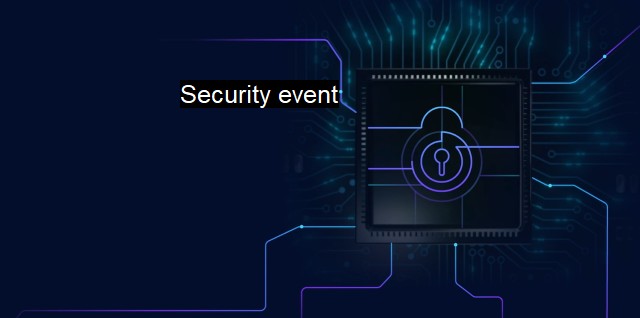What is Security event?
What is a Security Event? Understanding Abnormal Behavior and Threats in Cybersecurity and Antivirus.
A security event can refer to any abnormal activity or behavior that poses a threat to the security and stability of an organization's IT infrastructure. Common examples of security events include cyberattacks, data breaches, system failures, network intrusions, malware infections, and unauthorized access attempts.A security event is typically generated when an IT security system or tool identifies a security threat or anomaly that requires attention. This can include alerts or notifications sent by antivirus software, intrusion prevention systems, firewalls, SIEM (Security Information and Event Management) tools, and other security monitoring solutions.
Once a security event is detected, the next step is to investigate and analyze the event to determine the nature of the threat and its potential impact on the organization's systems and data. Security analysts may use various techniques and tools to investigate the event, such as system logs and monitoring dashboards, threat intelligence platforms, forensic analysis tools, and network scanning and analysis utilities.
The severity of a security event depends on several factors, including the type of threat, the systems or data affected, and the impact on critical business processes and operations. a malware infection that spreads across multiple systems and encrypts critical data can be a severe security event that requires immediate attention and remediation. On the other hand, a minor port scan or failed login attempt that does not result in any compromise might be considered a low-priority event that can be logged and monitored for future reference.
To respond effectively to security events, organizations typically have incident response plans and procedures in place. These plans outline a set of predefined actions that security teams should take when a security event is detected, such as isolating compromised systems, containing the threat, mitigating damages, and restoring the affected services and data.
Antivirus software is one of the main security solutions that organizations use to detect and protect against security events related to malware infections and attacks. Antivirus software works by scanning files and programs for known malware signatures and behaviors, comparing them to a database of known threats.
When an antivirus software detects a security event, such as a malware infection, it can take various actions to mitigate the threat, such as quarantining or deleting the infected file, blocking access to the malicious website or URL, or alerting the user or security team about the incident. Antivirus software also provides real-time protection to prevent future security events by detecting and blocking suspicious behavior or code execution.
relying solely on antivirus software to detect and protect against security events may not be sufficient in today's sophisticated threat landscape. Many threats use advanced tactics and techniques to evade detection, such as polymorphic malware, fileless malware, and advanced persistent threats (APTs). As a result, organizations must use a multi-layered security approach that combines different security solutions and techniques to address different types of threats and attack vectors.
a security event is a term commonly used in cybersecurity and antivirus to refer to any abnormal activity or behavior identified by security monitoring tools that pose a threat to the organization's IT infrastructure, systems, and data. Antivirus software is one of the main solutions used to detect and protect against security events related to malware infections and attacks. effective security requires a multi-layered security approach that integrates different solutions and strategies to address different types of threats and protect against evolving cyber risks.

Security event FAQs
What is a security event in cybersecurity?
In cybersecurity, a security event refers to any occurrence that can potentially compromise the security of a computer system, network, or data. It can involve unauthorized access, data theft, malware infections, or any other threat to the confidentiality, integrity, or availability of information.How do security events affect antivirus software?
Security events are crucial in detecting and responding to cybersecurity threats by antivirus software. Antivirus software relies on the information gathered from security events to identify and block malicious activities. Without security events, antivirus software cannot effectively protect against cyber threats.What is the role of a security event management system in cybersecurity?
A security event management system (SEMS) is a tool used in cybersecurity to manage and analyze security events. It enables security analysts to monitor and respond to threats in real-time by alerting them to suspicious activity. The SEMS collects data on security events, analyzes them, and provides valuable insights to improve the security posture of an organization.How can organizations prepare for security events in their cybersecurity program?
Organizations can prepare for security events by establishing a robust cybersecurity program that includes regular vulnerability assessments, security training for employees, and incident response plans. They should also implement security controls such as firewalls, antivirus software, and intrusion detection systems to prevent and detect security events. Finally, organizations must continuously monitor and update their security measures to stay ahead of evolving threats.| | A | | | B | | | C | | | D | | | E | | | F | | | G | | | H | | | I | | | J | | | K | | | L | | | M | |
| | N | | | O | | | P | | | Q | | | R | | | S | | | T | | | U | | | V | | | W | | | X | | | Y | | | Z | |
| | 1 | | | 2 | | | 3 | | | 4 | | | 7 | | | 8 | | |||||||